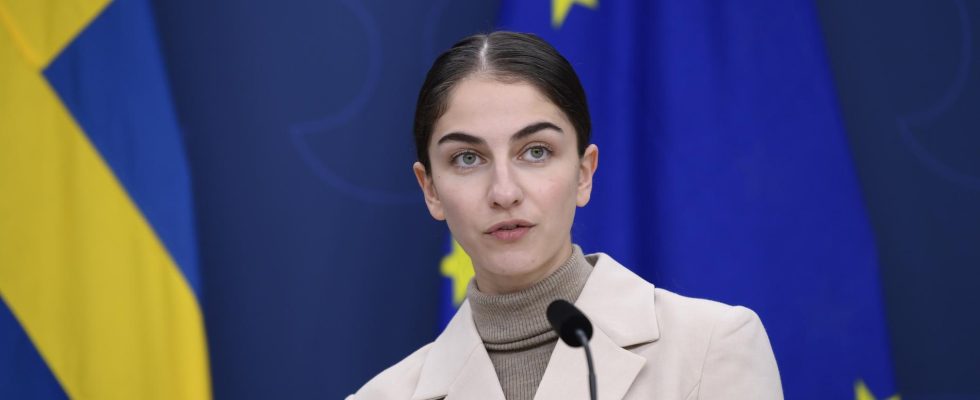Save the article
The climate minister hopes that the climate summit in Dubai will fire on the countries of the world to quickly reduce their emissions.
But at home instead, the government’s policy increases emissions of carbon dioxide.
On Thursday, the global UN meeting COP28 kicks off in Dubai in the United Arab Emirates. Ministers and officials from around 200 countries fly in to try to agree on a new climate policy.
Climate Minister Romina Pourmokhtari (L) hopes that the negotiations will focus on the urgency needed in climate work. Ahead of the meeting, there has been a string of reports that all show that the countries of the world are not doing enough to prevent climate change, and that measures are now required to quickly reverse the emission curves.
– My hope is that we can focus on how to scale up solutions and increase the pace, says Romina Pourmokhtari.
“Very high credibility”
However, the government’s own climate policy does not lead to reduced emissions. On the contrary, emissions of carbon dioxide will increase sharply in the next few years, mainly because the reduction obligation is lowered at the turn of the year to try to bring down fuel prices. This will reduce the amount of biofuel in the tank and the cars will run on fossil fuel and diesel to a greater extent.
TT: What credibility do you have to tell other countries that they need to reduce emissions quickly?
– I have a very high credibility in contrast to other EU countries and other parts of the world, says Pourmokhtari.
As an example, she mentions that Sweden and Portugal are the EU countries that today have the lowest emissions per capita and the Swedish export industry is an example that is “incredibly ambitious”.
– No one ever discusses Sweden’s reduction obligation with me at COP meetings, but on the contrary, people want to know how we succeed with the electrification of the transport industry, they want to hear about clean steel, they ask about Northvolt and they also want to know about Swedish climate policy the framework, she says.
That the government’s calculations show that emissions will now increase is not a big issue outside of the Swedish context, she believes.
– In the national context it is a very present issue, but internationally it is not, says Pourmokhtari.
Fossil fuels
An important issue at the meeting will be the global review that is being done for the first time of how far the world’s countries have come in meeting the Paris Agreement, and what should be done going forward. But there are also expected fights about money, including a new fund that will help the countries that are hit hardest by climate-related damage.
Overhanging all negotiations is also the question of the future of fossil fuels. Thus the main cause of global warming.
The Climate Minister believes that the most difficult issue at the COP will be precisely agreeing on phasing out fossil fuels.
– It is a difficult question, not least because many countries are dependent on fossil fuels as a source of income in their economy, she says.
Controversial oil CEO
The chairman of the meeting, Sultan Ahmed al-Jaber, is also the CEO of the United Arab Emirates’ largest oil company. The choice of chairman has attracted a lot of criticism, as well as the fact that the meeting is being held in an oil-producing country that has not exactly taken the plunge for a sustainable way of life.
But that doesn’t have to be a disadvantage, Pourmokhtari believes.
– As an optimist, I can see that there can be an advantage in the pressure that comes on a country like the United Arab Emirates. I think they feel the great pressure to deliver and I notice that they have a will to have a successful meeting, then we will see what it turns out to be in practice, she says.
FAKTAFN’s climate conference
The UN climate summits, COP, are held in different locations each year. COP stands for “Conference of the Parties” and refers to the parties to the UN Climate Convention.
COP28 will be held in Dubai, United Arab Emirates, from November 30 to December 12.
In the Paris Agreement of 2015, most of the world’s countries agreed to keep the increase in the global average temperature well below 2 degrees, and most preferably below 1.5 degrees, compared to pre-industrial times. This must primarily be done through reduced emissions of greenhouse gases.
In connection with COP28, the first global review (“global stocktake”) of how the countries’ efforts and commitments are in relation to the goals of the Paris Agreement is being completed. It is a reconciliation of how things are going in the fight against climate change and shows that global emissions are not in line with what is required to live up to the Paris Agreement. On the contrary, emissions continue to increase and the window to succeed in limiting warming to 1.5 degrees is closing quickly.
Read more
